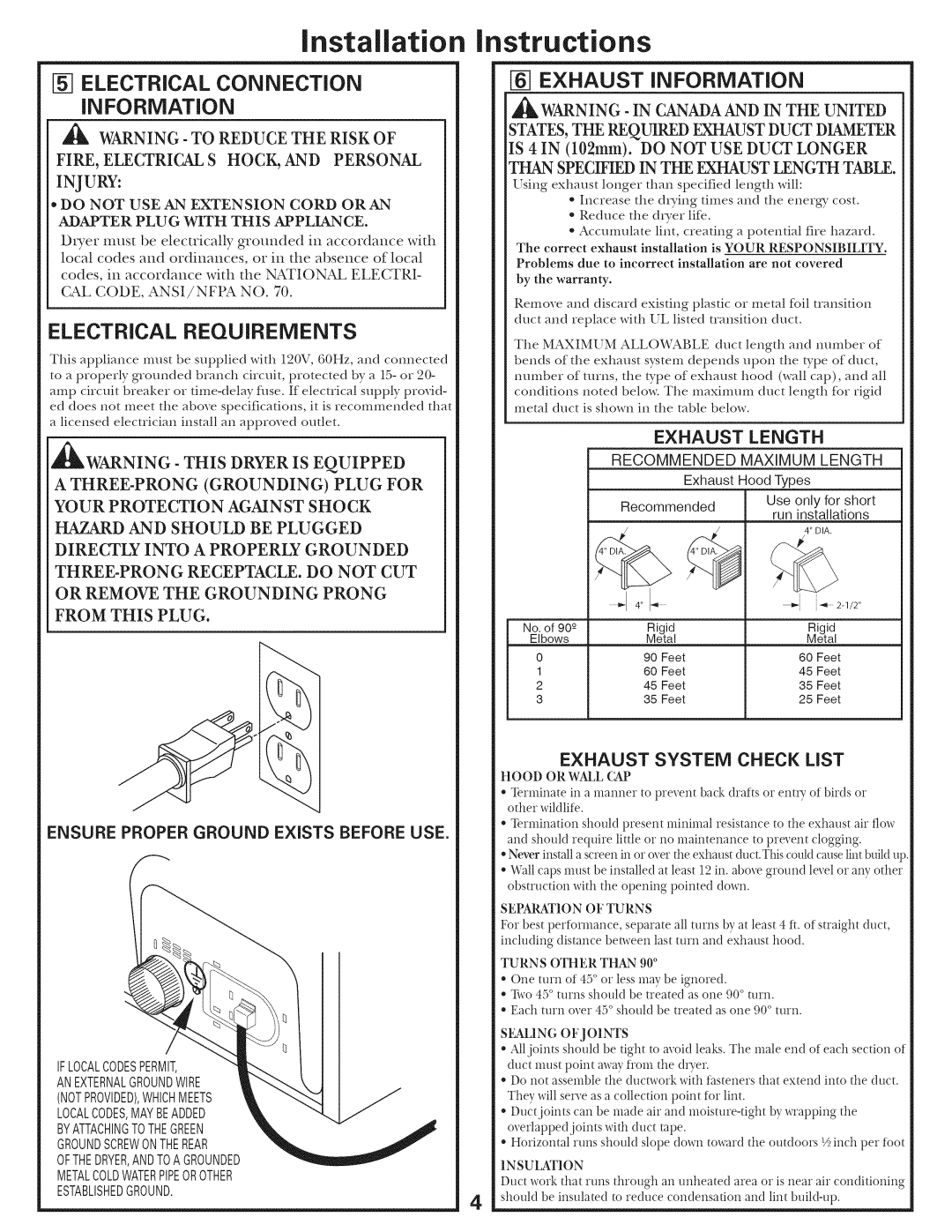
Installation instructions
[] ELECTRICAL CONNECTION
iNFORMATiON
WARNING- TO REDUCE THE RISK OF
FIRE, ELECTRICAL S HOCK, AND PERSONAL
INJURY:
* DO NOT USE AN EXTENSION CORD CRAM
ADAPTER PLUG WITH THIS APPLIANCE.
D1yer must be electrically grounded in accordance with
local codes and ordinances, or in tile absence of local
codes, in accordance with tile NATIONAL ELECTRI- CAL CODE, ANSI/NFPA NO. 70.
ELECTRICAL REQUIREMENTS
Tiffs appliance must be supplied with 120V, 60Hz, and com_ected
to a properly grounded branch circuit, protected by a 15- or 20-
amp circuit breaker or
ed does not meet the abo_e specifications, it is recommended that
a licensed electrician install an approved outlet.
_WARNING - THIS DRYER IS EQUIPPED
A
YOUR PROTECTION AGAINST SHOCK
HAZARD AND SHOULD BE PLUGGED
DIRECTLY INTO A PROPERLY GROUNDED
OR REMOVE THE GROUNDING PRONG FROM THIS PLUG.
ENSURE PROPER GROUND EXISTS BEFORE USE.
IFLOCALCODESPERMIT, ANEXTERNALGROUNDWIRE (NOTPROVIDED),WHICHMEETS
LOCALCODES,MAYBEADDED BYATTACHINGTOTHEGREEN
GROUNDSCREWONTHEREAR
OFTHEDRYER,ANDTOA GROUNDED
METALCOLDWATERPIPEOROTHER
ESTABLISHEDGROUND.
F6-]EXHAUST iNFORMATiON
_WARNING- IN CANADA AND IN THE UNITED
STATES, THE REQUIRED EXHAUST DUCT DIAMETER IS 4 IN (102ram). DO NOT USE DUCT LONGER THAN SPECIFIED IN THE EXHAUST LENGTH TABLE.
l_ sing exhaust longer than specified length wilh
*Increase the chying times and the energ F cost.
*Reduce the cho_er life.
*Accumulate lint, creating a potential fire hazard.
The correct exhaust installation is YOUR RESPONSIBILITY,
Problems due to incorrect installation are not covered
by the warranty.
Remove and discard existing plastic or metal foil transition
duct and replace with I_L listed transition duct.
The MAXIMI_ M ALLOWABLE duct length and number of
bends of the exhaust system depends upon the type of duct,
number of turns, the type of exhaust hood (wall cap), and all
conditions noted below. The maximum duct length for rigid metal duct is shown in the table below.
EXHAUST LENGTH
RECOMMENDED | MAXIMUM | LENGTH |
Exhaust | Hood Types |
|
Recommended | Use only | for short |
| run installations | |
4" DIA.
| 4" |
| _ | _ |
No. of 90 | Rigid | Rigid | ||
Elbows | Metal | Metal | ||
0 | 90 | Feet | 60 | Feet |
1 | 60 | Feet | 45 | Feet |
2 | 45 | Feet | 35 | Feet |
3 | 35 | Feet | 25 | Feet |
EXHAUST SYSTEM CHECK LiST
HOOD OR WALL (AP
•Terminate in a manner to prevent back drafts or entry of birds or other wildlife.
•Termination should present minimal resistance to the exhaust air flow
and should require little or no maintenance to prevent clogging.
•Never install a screen in or over the exhaust duct.This could canse lint build up.
•Wall caps must be installed at least 12 in. above ground level or any other
obstruction with the opening pointed down.
SEPARATION OF TURNS
For best perfermance, separate all turns by at least 4 ft. of straight duct, including distance between last ttlrn and exhaust hood.
TURNS OTHER THAN 90 °
* Oile ttlrn of 45 ° or less may be ignored.
,Two 45 ° tt/rns shouht be treated as one 90 ° tt/rn.
,Each tt/rn over 45 ° shouhl be treated as one 90 ° tt/rn.
SEALING OF JOINTS
* _Mljoints should be tight te avoid leaks. The male end of each section of duct must point away flom the dryer.
*Do not assemble the ductwork with fasteners that extend into the duct.
They will serve as a collection point fer lint.
Duct joints can be made air and
Horizontal runs should slope down toward the outdoors _½ inch per feot
iNSULATION
Duct work that runs through an unheated area or is near air conditioning
4 shouhl be insulated to reduce condensation and lint
